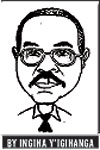We should celebrate our heroes We may be in a period of sad remembrance dedicated to the victims of the 1994 genocide, but we should not forget that many of our compatriots have been distinguished by singular heroism. For coming together so quickly after the 1994 genocide, Rwandans should celebrate the fact alone that it was possible.


We should celebrate our heroes
We may be in a period of sad remembrance dedicated to the victims of the 1994 genocide, but we should not forget that many of our compatriots have been distinguished by singular heroism.
For coming together so quickly after the 1994 genocide, Rwandans should celebrate the fact alone that it was possible.
For forgetting their heroism and self-pride and sinking into the shame of self-extermination, Rwandans almost lost their proud country. That they have regained their unity and their dignity is reason to forget the shame of 1994 and to celebrate their resurgence into the state they’ve always been.
The shame of our compatriots in self-exile should not drag us down either.
It’s only a matter of time and the prodigal sons/daughters will see the light.
Heroism has always manifested itself in many ways among our people.
The Basesero of Kibuye, for instance. The fact that the region had been neglected by the successive regimes that reigned in Rwanda before 1994 seems to have turned it into an ideal slaughterhouse.
Kibuye, today’s Karongi, was practically inaccessible from any corner, surrounded as it is by the impassable terrain of the then provinces of Cyangugu, Gikongoro and Gisenyi as well as the expansive waters of Lake Kivu.
And so while the killers in other parts of Rwanda waited for the signal to start their genocidal handiwork after the not-so-soft landing of Habyarimana from his blown-up personal jet, the killers of Kibuye had counted a number of dead Batutsi by morning the following day, 7th April 1994.
However, the victims did not take the onslaught lying down. The men hid their families – much as there was hardly anywhere to hide – and put up a spirited fight with only stones as their weapons, to counter bullets.
Up to June the Interahamwe had not made much headway in their killing madness and had to call for re-enforcements from the national armed forces (FAR).
Even then, the soldiers did not fare so well despite being heavily armed. In fact, they lost six guns and some ammunition to the besieged victims. When they heard of the arrival of the French soldiers on 25th June 1994, the victims came out of their hiding in the mistaken belief that the French were coming to keep the peace. That was their undoing: the Basesero were butchered literally to the last child.
Again, however, Bisesero is only an example. The number of killing scenes (and that of killing cycles in those 35 years) is as big as the number of hills in this land of more than ‘A Thousand Hills’: Gisozi in Kigali, Bigogwe in Ruhengeri/Gisenyi, Nyamata in Bugesera, Nyarubuye in Kibungo, Murambi in Gikongoro, one could go on. All were marked by acts of bravery by men, women and children who either died unnoticed or are going about their business in stoic silence, if they survived.
That is why our few known heroes are sung as symbols of Rwandans of all regions, of all age and calling. Think of all our compatriots who died in battles to defend our unity against the destructive forces of Banyoro, Bashi or Babisha of all forms in the far as well as in the near past.
Think of all the self-inflicted wars of, for instance, Urucuncu and the genocide of 1994 and many of our compatriots who braved the maniacal attacks and put a stop to these demonic forces that threatened our very existence as a people. Think of the many brave men, women and children who rose to the occasion and came together again in unity to rebuild their motherland.
Let us therefore celebrate the heroism of this land. Let us celebrate the Rwigemas, Rudahigwas, Uwilingiyimanas and the youths that have lived, are living and may live on, or just originate from, the ridges and in the valleys of Rwanda.
You are a hero, you who are tilling the land or tending your livestock to nourish your country folk. You are a hero, you who are working at any place, public or private, if your considerations are not for self but are for country.
You are a hero if as a judge you do not need to solicit a bribe before you can write out a legal verdict. As our Rwandan hero, be selfless in your work and as a journalist dedicate yourself to exposing the ills in any of our institutions, if any has erred or is in any way involved in malpractices.
On the other hand, you are a villain if as a journalist your work is instead to insult your leaders without a thought for the good job they may be doing. Institutions are used or abused by individuals, yes, and so no one can deny the importance of exposing villains for embezzling. Insult the guilty, but don’t insult for reasons of self-absolution.
As heroes go, however, our greatest hero is our culture. All of you out there are heroes if you can uphold the values of our culture: valour, selflessness, humaneness, humility, caution and commitment.
Rwanda became a villain the moment her people embraced the culture of glorifying personal power, histrionics; of worshipping fraudeurs, influence peddlers, rapists, mass killers, thieves and robbers.


